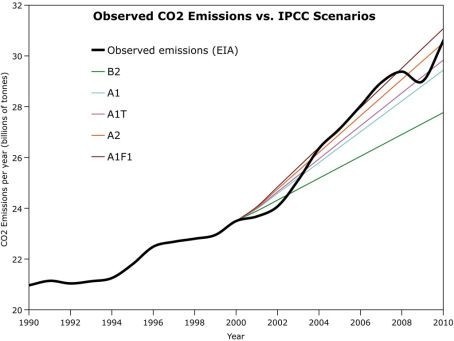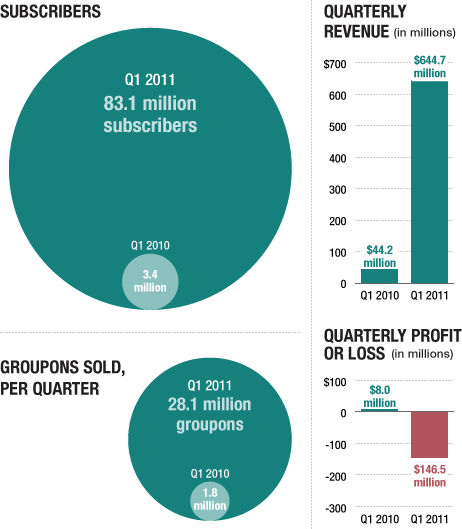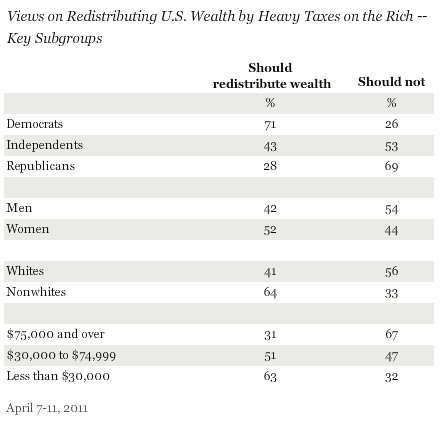Matthew Yglesias's Blog, page 2287
June 3, 2011
CO2 Emissions Back On The Rise
The global recession managed to reduce the trend level of world greenhouse gas emissions and buy us all a bit more time to ward off planetary doom. That's not the good way to avoid climate catastrophe, but it's something. Now, though, Brad Plumer's got the International Energy Agency data that says the breathing room is gone and we're back on trend:

This is developed world growth + no global agreement on emissions.


Groupon Economics
Via Jacob Goldstein, according to its IPO filing Groupon seems to have achieved its impressive growth through a campaign of aggressive deficit spending:

Maybe this will work out, or maybe it will be a disaster. But it's worth noting that absolutely nobody thinks it's categorically absurd to think that what a firm needs to do to maximize long-term profits is boost spending over revenues. The idea here is that there are substantial network effects in the online coupon business, such that one dominant player will earn lots of money and the minnows won't. Under the circumstances you want to spend what it takes to become that dominant player.


White People Skeptical Of Redistributive Taxation, Poor People Love It
Higher taxes on high income individuals always polls quite well as a means of closing fiscal gaps. Consequently, I've always found it a bit puzzling that the rhetoric of politicians opposed to such taxes tends to emphasize the idea that they constitute "class warfare." You'd think that's the appealing part of it! But I guess not. Gallup did a poll where they didn't ask people if taxing the rich is a good way to close the deficit. Instead they asked "do you think our government should or should not redistribute wealth by heavy taxes on the rich?" In 2007, they brought forth a 49-47 result in favor, and today it gets you 47-49 opposed.
Here's the demographic breakdown:

The public is pretty evenly divided on this, but support for redistribution is concentrated in demographic categories (poor people, black people) who are disproportionately unlikely to vote. Then over and above actual voting, the $75,000 and over crowd has higher social capital and is the donor base for both parties. In general, this poll seems to support the Lupu and Pontussen thesis that middle class white Americans have an unusually low sense of solidarity with low-income Americans due to ethnic differences.


The Ongoing Conservative Recovery
The private sector added 83,000 jobs in May. That's not a very good number, but it's an okay one. It's especially okay when you see it in the context of increased hours worked per employed person leading to increased earnings. You could see this as employers continuing to increase their demand for labor, but in a slightly cautious way. A month of treading water on the jobs front but with indicators that we're due for a better number soon. But instead of adding tens of thousands of new public employees to complement the expansion, we shed 29,000 public sector workers. That led to an aggregate figure of 54,000 new net jobs.
To me, that's terrible.
But it's crucial to understand what it is, which is the same thing we've been dealing with for a long time now. Over the past year, we've consistently seen the economy engage in so-so private sector job growth offset by job losses in the public sector. The results are, if you ask me, bad. But in a decent world, conservatives would be forced to acknowledge that these are the results they claim to want. The private sector's not being held back by the grasping arm of big government. Government is shrinking. And the shrinking of the government sector isn't leading to any kind of private sector explosion. It's simply offsetting meager private sector growth. Indeed, I'd say it's holding it back. Fewer state and local government layoffs would mean more customers for private businesses and even stronger growth on the private side.


Relative Decline In The Face of Third World Economic Growth Is Not A Choice
In a move that I think you can only interpret as a testing of the waters for a presidential run, Paul Ryan delivered a big address on foreign policy last night. There's a lot of stuff going on here, but one key meme is the idea that conservatives, allegedly in contrast to liberals, want to avoid the specter of American decline:
Look – our fiscal problems are real, and the need to address them is urgent. But I'm here to tell you that decline is not a certainty for America. Rather, as Charles Krauthammer put it, "decline is a choice."
In absolute terms, yes, of course. Decline in American living standards is not a certainty. Indeed, it's unlikely. But in global power politics terms, while nothing's a certainty it's just not the case that relative decline is a choice. Many large countries used to follow very bad public policy. With improved policy, countries such as China, India, and Brazil are now catching up to America. This process may continue for a long time, it may slow, or it may halt. But it's likely to continue. And the choices that are relevant to the outcome will be made in China and India and Brazil, not in Washington. It's both dangerous and foolish to base foreign policy on pretending not to see this trend.
The good news for America in the face of relative decline is that both our geographical position and our democratic values make us a preferred partner for almost every country on earth. We're well-positioned to play a leading role in an extremely broad coalition of liberal states that will have the ability to shape world affairs. But it'll have to be a coalition, and it'll take savviness about the reality of other states and people's around the world catching up.


Breakfast Links: June 3, 2011
— House of Representatives actually going to hold a vote on Libya and war powers.
— PACER redaction failures.
— The most expensive parking in DC.
— Things that were hot in NYC in the '90s, resembles my life enormously. Oh, that Astor Place Cube!
— Maine rejects nullifcation.
— Dispersants ban moving forward in Louisiana.
— Normalizing .
— Wisconsin GOP discusses planting Democratic spoiler in recall election.


June 2, 2011
Dimensions Of Inequality
I'm reading Ron Chernow's Alexander Hamilton, and since he's a Hamilton fan, he naturally makes a big deal out of the irony of southern slaveholding white supremacists like James Madison and Thomas Jefferson positioning themselves as the friends of equality and the little guy against Hamilton. And, of course, by our lights it is ironic. But it's worth understanding the fact that this wasn't really ironic at all by the lights of the time. Egalitarianism and white supremacy went hand in hand.
This is something Alan Taylor's American Colonies is really good on. His point is that if you look at the European aristocrats who ran the governments that colonized America, none of them were big into racism. In their eyes an African slave, a (Native) American savage, and a European peasant are all about on a par — they're the scum of the earth, to be exploited economically, and perhaps feared as a potential source of violence and disorder. European governments of the 16th and 17th centuries typically presided over multiple linguistic groups, and important aristocrats could have very diverse landholdings. This was a very class-bound society, and the division between the elite and commoners was much more important than any proto-national considerations. In one possible world, this mindset is transplanted onto American soil as a wealthy elite lords over a multi-cultural, multi-racial proletariat.
But that didn't happen. Instead, especially in the territories that became the USA, a strongly anti-classist Jeffersonian (and later Jacksonian) ideology of white supremacy developed. It's not, "on the one hand, racism; on the other hand, egalitarianism." It's "we're all equal in our privileged whiteness."
I thought of this when I read Ellis Cose on declining perceptions of anti-black bias among the younger generation of African-American elites. The United States is clearly a much less racist society in 2011 than it was 50 years ago. But it's also become a much more class-bound society. Working class whites have seen a huge erosion in social privilege over and above the concrete economic struggles of the working class, and white elites have much less of a sense of solidarity with the white working class than was the case in the past. And African-American elites are increasingly just elites, living in the same neighborhoods and attending the same schools as white elites. That's not to say we should believe in a "lump of justice" such that racial progress necessarily comes at the expense of economic equality. But there are multiple dimensions of inequality and social privilege, and tradeoffs between them do happen at the margin.


Will The Egg-On-Face Factor Lead To An Economic Calamity?

Your quotes of the day:
"Of course, it's dangerous," a House Republican close to Boehner said of the politics of a government default. "But it's dangerous for everybody, especially the president. At the end of the day, [Obama] will have to give in."
"Who has egg on their face if there is a sovereign debt crisis, House Republicans or the president?" asked another senior GOP lawmaker.
This is, incidentally, why it was a mistake of the White House and Congressional Democrats to get dragged into a negotiation in the first place. That said, the evidence from political science does appear to suggest that if Republican intransigence destroys the American economy, that the voters will respond to this by punishing the incumbent President and electing a Republican. Obviously the models on which that conclusion is based don't include a scenario in which out-party irresponsibility leads to sovereign default. No model is better than the parameters in which it's based, and a sovereign default could easily be a model-busting occurrence. Still, it seems like at least one "House Republican close to Boehner" thinks this isn't the case and the president will get most of the blame for a default. That's a dangerous case of power without responsibility.


Education Department Releases New, Fairly Watered-Down Regulation of For-Profit Colleges

My colleague Pat Garofalo has what you need to know about the new Department of Education "gainful employment" regulations on what kind of for-profit schools can be eligible for federally subsidized student loans up at ThinkProgress' new Economy Section:
The Department of Education today released long-awaited new regulations meant to curb abuses in higher education. As we've been documenting, for-profit colleges — schools like the University of Phoenix or Kaplan University — have been collecting 90 percent of their revenue from the federal government while leaving their students buried in debt and with bleak job prospects. (For more background on this issues, see our primer, "For-profits, not students.")
The new regulations are intended to cut off higher education programs from federal money if too many of their students can't find good jobs and default on their loans. However, after months of intense lobbying by the for-profit schools, their front groups, and conservative lawmakers, the new rules are significantly weaker than draft rules first proposed by the Education Department last year.
Read the rest.


Charter Schools And Low-SES Students: Damned If They Do and Damned If They Don't?
On average, charter schools seem to be about average. But some charter school networks seem to do much, much, much better on average. That's worth knowing for two reasons. One is that we should be encouraging highly effective charter networks to expand, since more high-quality schools is a good thing. The other is that the success of some of these networks demonstrates that it's possible to overcome challenging demographics. The most scrutinized of these successful charter networks is the Knowledge Is Power Program and the latest research (PDF, via Adam Ozimek) once again shows substantial KIPP-linked gains for poor kids, especially the weakest students and special ed kids.
The study also looks at the issue of whether KIPP is "skimming" through a high attrition rate. The authors confirm that KIPP does, indeed, have a high attrition rate. But it also finds that students who won the KIPP admissions lottery are no more likely to switch schools than those who lost. So it's KIPP's attrition rate, not the success of its students, that reflects a selection effect.
I think charter proponents may finally be winning this argument, since I just read a piece by Dana Goldstein making the reverse of a skimming critique, arguing that "there are some troubling questions about whether the most politically popular charter school model—the 'No Excuses' model popularized by KIPP and embraced by Moskowitz's Success Charter Network—is palatable to middle-class and affluent parents." In other words, if KIPP's not condemned for skimming the easiest cases, it's condemned for promoting segregation by declining to make itself appealing to the easiest cases.
To me, this is misguided. It all goes back to the basic issue of why poor kids do better in less segregated schools in the first place. Basically, kids seem to benefit from picking up certain bourgeois modes of behavior. Bourgeois kids generally pick them up from their parents. Poor kids can pick them up from their peers, but only if they go to a school with a relatively low concentration of poverty. Poor kids in a high-poverty school can also receive explicit instruction in bourgeois conduct. That's the essence of the "No Excuses" model, but it doesn't make sense in a bourgeois context. We should think of these kind of schools as stopgaps, workable solutions to the difficult problem of running a school in an environment of concentrated poverty. For a whole variety of reasons we should be trying to break those concentrations up and reduce the overall level of poverty. But given that concentrated poverty isn't going to vanish next week, we should also be applauding people who are finding ways to make it work.


Matthew Yglesias's Blog
- Matthew Yglesias's profile
- 72 followers



